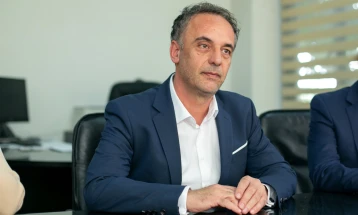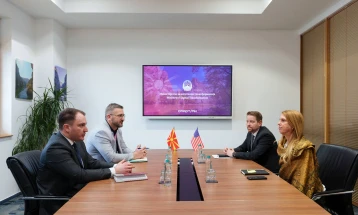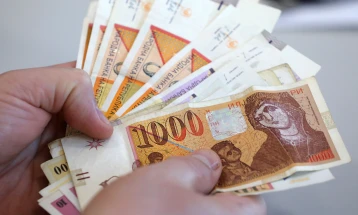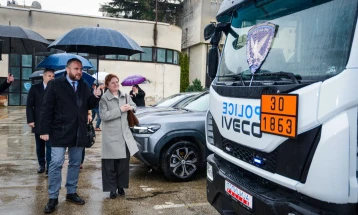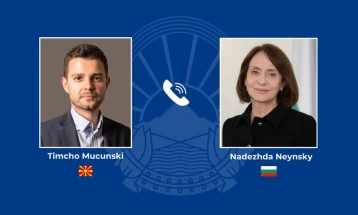North Macedonia signs protocol with Bulgaria, first IGC to take place Tuesday
- Post By Silvana Kocovska
- 07:31, 18 July, 2022
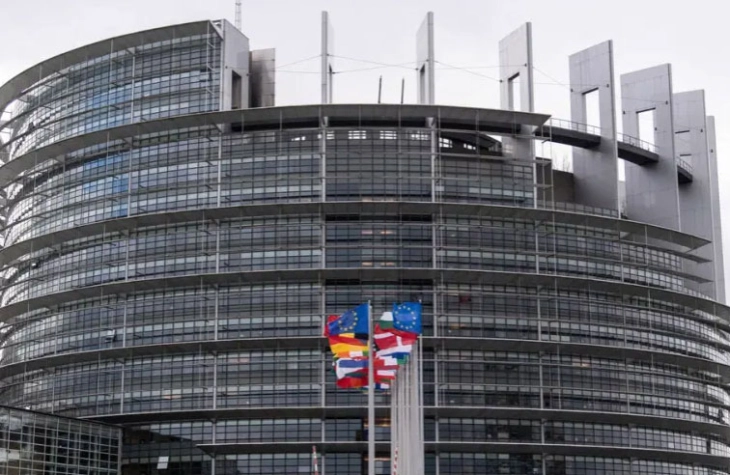
Skopje, 18 July 2022 (MIA) - North Macedonia will hold its first intergovernmental conference (IGC) with the EU on Tuesday (July 19) in Brussels with Prime Minister Dimitar Kovachevski reading the opening statement in Macedonian language. Afterwards the screening process opens, which is expected to take a year and a half. The screening process will be followed by a second intergovernmental conference, which is conditioned by constitutional changes.
The Ministers of Foreign Affairs of North Macedonia and Bulgaria, Bujar Osmani and Teodora Genchovska respectively, signed Sunday the bilateral protocol after a meeting of the joint intergovernmental commission.
“Bulgaria is the country that strongly supports the European integration of the Republic of North Macedonia and Albania. We wish them success on the path they wanted to embark on for a long time. I hope with joint efforts and with our support the citizens of North Macedonia will join the EU,” Bulgarian Foreign Minister Teodora Genchovska stated Sunday after the signing of the bilateral protocol in Sofia.
North Macedonia’s Foreign Minister Bujar Osmani said he hoped a new chapter in the relations between the two countries is being opened today.
“It is a historic opportunity that after 17 years of being a candidate country, the Republic of North Macedonia gets the chance to start negotiating with the EU as early as the day after tomorrow, which kickstarts the final phase of our process to join the EU. We hope the bilateral process with Bulgaria and the accession negotiations will enable closer cooperation between our countries. We expect Bulgaria to support us along this road,” Osmani stated after the signing of the document.
Both ministers said the five sectoral groups have made progress urging it to be implemented into practice.
The signing of the protocol and the holding of the meeting of the intergovernmental commission took place after the French proposal was approved by the government and after the adoption of the conclusions in the Macedonian Parliament.
We had three crucial issues that mattered to us – the language, historical issues not to determine the opening and closing of chapters, and negotiations to start now. We got all three of them, Foreign Minister Bujar Osmani said Sunday presenting the Protocol signed earlier today in Sofia.
“Bulgaria got conditioned second intergovernmental conference (IGC) with constitutional changes. This is the compromise,” he added.
Support for North Macedonia’s EU integration is an integral part of the Protocol, where the holding of the first Intergovernmental Conference (IGC) with the EU is explained. In this case, it is divided into two phases – political conference, opening of the screening process, followed by a second conference and the opening of chapters only after North Macedonia changes the Constitution to include the Bulgarians.
Osmani told the press briefing that the screening process will be launched right after the intergovernmental conference on July 19.
Bulgaria has expressed readiness to agree to the first political intergovernmental conference with the EU with an understanding that the next intergovernmental conference to complete the opening of negotiations phase will be held right after North Macedonia in its Constitution includes its citizens that live on the territory of the country and are part of other peoples, such as the Bulgarian people, according to the Protocol.
“According to the French proposal, the intergovernmental conference will take place the day after tomorrow before the screening process opens, expected to take a year and a half. The screening process will be followed by a second intergovernmental conference, which doesn’t require a European Council decision. Decisions will be made tomorrow at 6:30 pm about the two conferences – about the first one before the screening and about the second one after this process, however the second conference is conditioned by constitutional changes,” said Osmani.
He stressed that “part of other peoples” means the same what other communities in the country have. The section where it reads Serbian, Vlach, Roma people, will continue with Croatian, Montenegrin, Bulgarian people. This isn’t a novelty, Osmani added mentioning Croatia, which had included 25 communities in the Constitution before joining the Union.
The document states that the government of North Macedonia agrees that the next intergovernmental session to complete the opening of negotiations phase should be held after the constitutional changes are enforced to include its citizens that live on the territory of the country and are part of other peoples, such as the Bulgarian people, according to internal procedures.
“With full moral and political responsibility, I say that the Macedonian language remains clear, no footnotes no adjectives,” he stressed.
“On bilateral relations, we’d closed the issue with the Republic of Bulgaria. It is the linguistic clause from 1999 and 2017 – Macedonian language according to the Constitution, Bulgarian according to the Constitution, because it is a closed matter and we have never during the negotiations tried to change Bulgaria’s position. We have only tried to prevent this position from becoming European position. We’ve won this battle, because from now on, the language in the EU will be clear without further qualifications and footnotes,” said Osmani.
Referring to Bulgarian FM Teodora Genchovska’s statement about the Macedonian language, he said it was in the context that Bulgaria cannot impose its position on the European Union.
Following Osmani’s press briefing, VMRO-DPMNE leader Hristijan Mickoski in an interview with Sitel TV said that during the negotiation process, Bulgaria does not close the issue of the Macedonian language.
Mickoski said that he will suggest at party’s executive committee for launching of an initiative for collecting 150.000 signatures required to organize a referendum at which the citizens will say whether they are support or not the protocol signed by the government.
A total of 44 members of Parliament of VMRO-DPMNE and its coalition have notarized statements that they will not accept amendments to the Constitution with clear conscience and sound mind as a guarantee to the people, VMRO-DPMNE leader Hristijan Mickoski revealed at a news conference Saturday.
Unlike the opposition, the ruling SDSM has evaluated this process as a success for the citizens and the state, underscoring that they continue at an accelerated pace to join the great European family where finally, the Macedonian language will resound across Europe. ba/sk/


